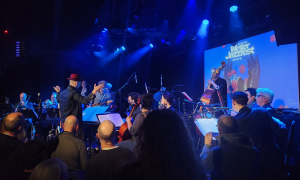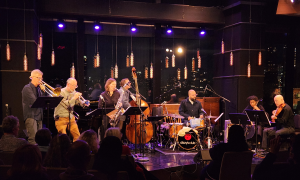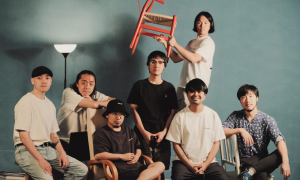Home » Jazz Articles » Live Review » John McLaughlin: On The Road, Part 5: Ottawa, Canada
John McLaughlin: On The Road, Part 5: Ottawa, Canada

Good bands make due when faced with disadvantage; great bands turn disadvantage into advantage. While Ottawa's Dominion-Chalmers United Church is a beautiful venue for chamber music, or even acoustic jazz, its cathedral ceiling and ten-second natural reverb could have spelled real trouble for John McLaughlin and The 4th Dimension. Even with the ever-capable Sven Hoffman at the soundboard—who has been working with the guitarist for a decade—the sound check didn't bode well for the evening's performance, despite the fact that, once there was an audience in the room to help absorb some of the sound, things would likely improve.
And while they did improve, the performance got off to a shaky start. With a set list that has settled into a fairly standard order, the energetic "Raju" had its moments, but it was clear that the group was struggling with the room sound coming back at them and muddying the waters.
But by the time the group launched into keyboardist/drummer Gary Husband's arrangement of Miles Davis' "Jean Pierre," something magical began to happen. As abstract as Husband's reworking is, the group settled almost immediately into a defined swing, with Husband and McLaughlin playing off each other rhythmically before the guitarist found his way to the sing-song theme, twisted on its side by Husband's heavily altered accompaniment. With drummer Mark Mondesir fluidly shifting to a funkier backbeat, the song took off in a way that it hadn't in either Durham or Montreal.

It was a greasier, sleazier groove, with the group taking advantage of the sound of the room and playing with more space and greater nuance. Husband's solo was stunning, and McLaughlin—with a slight delay added at the soundboard—seemed to break new ground, bending notes and adding a touch of B.B. King- style vibrato to his rapid-fire runs and visceral whammy bar twists. His solo built to a near frenzy, with a real sense that something different was happening, and not just with him but the entire group.
Bassist Hadrien Feraud—who'd already set the bar high during his impressive first solo on "Raju"—grooved hard with Mondesir; the eye contact and smiles between the two made it clear just how much fun they were having. As was everyone onstage.
The dynamics came down for a lyrical version of "Nostalgia," a ballad that, nevertheless, possessed its own kind of insistent power, and featured another strong solo from Husband, this time on synth, with a flute-like tone and near-vocal expression.
McLaughlin's solo ranged from economical elegance to flexible dexterity. For a guitarist who has redefined and reinvented himself so many times over the course of a career entering its fiftieth year, he still continues to surprise with new approaches to melody, rhythm and style. In an interview with Husband before the show that will be part of a wrap-up article after the final show, the keyboardist/drummer talked about just how terrific a rhythm player McLaughlin is, citing his work on Miles Davis' A Tribute to Jack Johnson (Columbia, 1970) as a defining moment. It's too easy to be overwhelmed by McLaughlin's inestimable skill as a soloist, but over the course of this tour he's played more accompaniment, something that he's often avoided in previous bands like The Heart of Things band where, with a larger line-up, there was less room to move. Here, his rich harmonic sense was coupled with a rhythmic intuition that ran the gamut from arpeggiated chords to chunky punctuations.

Like a conversation, the smaller the group, the more intimate the interaction can be, and it's rare that McLaughlin has toured with just a four-piece band, but it's that efficient size that's allowed this group the freedom of expression to take the material to unexpected places. Husband began the up-tempo "Hijacked." as always, with a synth sequence, but when McLaughlin and Feraud joined together on its complex theme, things really took off, as the evening made another significant leap forward. Feraud's solo, accompanied by the twin-percussion of Mondesir and Husband (on his "jungle kit"), was one of a number of standing ovations that the enthusiastic, near-capacity audience gave throughout the 100-minute set. It turned into a fast-swinging blues for McLaughlin's solo, the perfect nexus of focused energy and balanced restraint.
The visceral groove of "The Unknown Dissident" was another opportunity to appreciate this group's deep melodism. It may well be the most lyrical electric group McLaughlin has ever had, while still retaining the burning energy that fans have come to expect. It's also the most powerfully grooving band he's had, largely due to Mondesir's ability to flex his muscles and interact at a high level, while never losing sight of the need to ground the group—especially with Feraud, who's often almost like a second guitarist but is equally aware of the need to keep movement anchored to a firm pulse. And when Mondesir took his one solo of the night on "5 Peace Band," it was a rare combination of power and finesse that turned the heat up even further after McLaughlin's fiercely forceful solo, on which he was accompanied only by both Mondesir and Husband—both on drums.
The Ottawa performance felt like a tour highpoint for everyone, despite the occasional intrusion of the room resulting in a few missteps. Husband turned in his best piano solo yet on "Senor C.S.," from Industrial Zen (Verve, 2006); powerful, beautifully conceived, dynamic and built on clear conception, it had it all. When the band launched into the extended set closer, "Mother Tongues," it became a near free-for-all as everyone turned in the most dramatic, relentless playing of the night—all the more remarkable for the foursome having this much energy left in them. There were numerous trade-offs---Husband and McLaughlin in tandem alternating with Mondesir and Feraud, before shifting to a lengthy passage during which Feraud and McLaughlin's simple harmonics provided rallying points for Husband and Mondesir, whose muscular interaction was yet another high point.

It was surprising to learn that Mondesir and Husband have worked together only a few times in the past— though they did release a DVD with Mondesir's brother Mike on bass, To the Power of Three (RSJ Groove, 2003). Their shared respect and admiration has been one of many defining characteristics of this tour. All too often, two percussionists do nothing more than get in each other's way, but with ears wide open, Mondesir and Husband were able to move from remarkably complementary playing to, at one point, visceral unison with a strong funk backbeat. Husband's "jungle kit"—two industrial-sounding cymbals, a small bass drum, snare and tom—was put together to contrast with Mondesir's crisper cymbals and deeper drum sound; together they made one joyous noise.
Closing the evening, as they did in Montreal, with an encore of the beautifully spare "Light on the Edge of the World," originally recorded by Pharoah Sanders, McLaughlin and The 4th Dimension left the audience spent but happily sated. It's been thirty-five years since McLaughlin played in Ottawa, leaving a lasting impression, but this 2007 performance should be no less memorable, a singular experience for those fortunate to be in attendance.
Part 6 of AAJ's extensive On the Road series continues on October 5, when McLaughlin and The 4th Dimension finish up the tour at Massey Hall, in Toronto.
Photo Credit
John Kelman
Part 1 | Part 2 | Part 3 | Part 4 | Part 5 | Part 6 | Part 7
Tags
PREVIOUS / NEXT
Support All About Jazz
 All About Jazz has been a pillar of jazz since 1995, championing it as an art form and, more importantly, supporting the musicians who make it. Our enduring commitment has made "AAJ" one of the most culturally important websites of its kind, read by hundreds of thousands of fans, musicians and industry figures every month.
All About Jazz has been a pillar of jazz since 1995, championing it as an art form and, more importantly, supporting the musicians who make it. Our enduring commitment has made "AAJ" one of the most culturally important websites of its kind, read by hundreds of thousands of fans, musicians and industry figures every month.
























